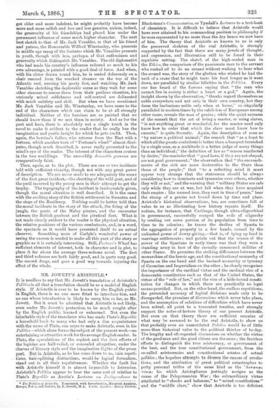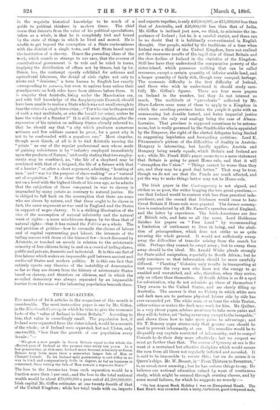MR. JOWETT'S ARISTOTLE.*
IT is needless to say that Mr. Jowett's translation of Aristotle's Politics is all that a translation should be as a model of English style. If Aristotle is ever to he known by the English public in English, there is no one more fitted to introduce him, and no one whose introduction is likely to carry him BO far, as Mr. Jewett. But it must be admitted that Aristotle is not likely, even under Mr. Jowett's protection, to be much sought after by the English public, learned or unlearned. Not even the inimitable stile of the translator who has made Plato's Republic a household-book to many who had only a dim acquaintance with the name of Plato, can serve to make Aristotle, even in his Politics—which alone forms the subject of the present work—an entertaining or attractive work for the average English reader. In Plato, the speculations of the sophist and the first efforts of the logician are half-veiled, or concealed altogether, under the charms of literary style and the imaginative flights of the prose poet. But in Aristotle, as he has come down to us, vain repeti- tions, hair-splitting distinctions, would-be logical formalism, stand out in all their repulsiveness. Whether the fault lies with Aristotle himself it is almost impossible to determine. Aristotle's Politics appear to bear the same sort of relation to Plato's Republic as Austin's Lectures on Taiispeudence to The Polities of Aristotle. Ts analated, with IntrodnetiGn, Marginal Analysis, Essays, Not-,, and Indices, by B. dowett, M.& 2 role. London Henry Frowde. Blackstone's Commentaries, or Tyndall's Lectures to a text-book of chemistry. It is difficult to believe that Aristotle would have ever attained to his commanding position in philosophy if he were represented by no more than the dry bones we now have of him. The theory that Aristotle as known to us is only the preserved skeleton of the real Aristotle, is strongly supported by the fact that there are many jewels of thought, and expression, and illustration still to be found in their repulsive setting. The sketch of the high-sonled man in the Ethics, the comparison of the passionate man to the servant who rushed off to do an errand without waiting to hear what the errand was, the story of the glutton who wished he had the neck of a crane that he might taste his food longer as it went down, are paralleled by similar felicities in the Politics. Every one has heard of the famous saying that "the man who- cannot live in society is either a beast or a god." Again, the. insight shown by the observation, "Greeks regard themselves as noble everywhere and not only in their own country, but they deem the barbarians noble only when at home," so singularly paralleled in modern times by the sahib-ism of Europeans among other races, reveals the man of genius ; while the quiet sarcasm of the remark that the art of being a master, or using slaves, "is not anything great or wonderful, for the master need only know how to order that which the slave must know how to execute," is quite Socratic. Again, the description of man as "by nature a political animal ;" the remark that "as a feast to- which all the guests contribute is better than a banquet furnished by a single man, so a multitude is a better judge of many things. than an individual ;" the definition of law as "reason unaffected by desire;" the reminder that "good laws, if they are not obeyed, are not good government ;" the observation that "the encroach- ments of the rich are more destructive to the State than those of the people ;" that "to a reflecting mind it must appear very strange that the statesman should be always considering how to dominate and tyrannise over others, whether they will or not," and the warning that "military States are safe- only while they are at war, but fall when they have acquired their empire ; like unused iron, they rust in time of peace," bear the stamp of a genius not bound down by time and place. Aristotle's historical observations, too, are sometimes full of value to us as illustrating how history repeats itself. He- notices, for instance, that Carthage, though ultra-oligarchical- in government, successfully escaped the evils of oligarchy by sending out some portion of its population from time to. time to its colonies ; he traces the decline of Sparta to- the aggregation of property in a few hands, caused by the- unlimited power of dowry-giving,—that is, of tying up land in marriage settlements ; and points out that the reason of the power of the Spartans in early times MU that they were a standing army in face of the casually summoned militias of other States. He perceives the striking differences between the- monarchies of the heroic age, and the constitutional monarchy of" Sparta on the one hand and the bastard monarchy or tyranny, of Ceesarism and Imperialism on the other ; he clearly recognises the importance of the cardinal virtue and the cardinal vice of a democratic constitution such as that of the -United States, the virtue of the "rule of law," and the vice of a hide-bound consti- tution for changes in which there are practically no legal means provided. But, on the other hand, the endless repetitions,, the pretended accuracy of logical divisions made only to be- disregarded, the promises of discussions which never take place,. and the assumption of solutions of difficulties which have never been solved, all point to a truncated treatise, and strongly support the notes-of-lecture theory of our present Aristotle. But even on that theory there are sufficient remains of what may be assumed to be the real Aristotle, to show us that probably even an unmutilated Politics would be of little more than historical value to the political thinker of to-day. The lengthy and oft-repeated discussions on whether the virtue of the good man and the good citizen are the same ; the fruitless efforts to distinguish the true aristocracy, or government of the best, and the true constitutional government, from the so-called aristocracies and constitutional estates of actual politics ; the hopeless attempts to discern the causes of revoln• tions, and the attribution of great political catastrophes to petty personal trifles of the same kind as the ' AgIrasigc 7.-6pya; 11;e which Aristophanes jestingly assigns as the cause of the Peloponnesian War ; the extraordinary virtue attributed to "checks and balances," to "mixed constitutions" and the "middle class," show that Aristotle is too deficient in the requisite historical knowledge to be much of a• guide to political thinkers in modern times. The chief cause that detracts from the value of his political speculations, taken as a whole, is that he is completely tied and bound by the state of things in which he lived and moved. He is unable to get beyond the conception of a State conterminous with the district of a single town, and that State based upon the institution of a slavery. Hence the pervading ideas of the work, which sounds so strange to our ears, that the essence of constitutional government is to rule and be ruled in turns, implying the distribution of offices not by fitness, but by lot. Hence, too, the contempt openly exhibited for artisans and agricultural labourers, the denial of civic rights not only to aliens and "denizens," a term known to English law exactly itorresponding to ,eseroesos but even to natives born unless their grandparents on both sides have been citizens before them. It is singular that Aristotle, living under the Macedonian era, and with full knowledge of the Arnphicty-onic Council, should have been unable to realise a State which was not small enough to hear the voice of a single town-crier,—" For who can be the general of such a vast multitude, or who the herald (or crier), unless he have the voice of a Stentor ?" It is still more singular, after the expression of his opinion on military States already referred to, that he should say that "a city which produces numerous artisans and few soldiers cannot be great, for a great city is not to be confounded with a populous one." Most singular, though most Greek, of all is it to find Aristotle naming the 'pirate" as one of the rep:Car professional men whose mode of gaining subsistence is by "industry employed immediately upon the products of Nature," and coolly stating that two employ- ments may be combined, as, "the life of a shepherd may be combined with that of a brigand, the life of a farmer with that of a hunter ;" or, after a short argument, admitting "hunting of men " and" war for the purpose of slave-making" as a " natural art of acquisition." It is clear that in this matter Aristotle is not on a level with the highest ideals of his own age, as he admits that the subjection of those conquered in war to slavery is impeached by many jurists as contrary to natural justice. He is obliged to fall back on the assumption that there are some who are slaves by nature, and that these ought to be slaves in fact, the same argument as was used in England and the States in support of negro slavery. It is a striking illustration of the vice of the assumption of natural inferiority and the natural want of rights—a more mischievous dogma by far than that of natural rights—that it has ruined the Politics as a whole. The real problem of politics—how to reconcile the claims of labour and of capital representing past labour, the interests of the toiling masses with those of the leisured few—is not discussed by Aristotle, or touched on merely in relation to the aristocratic minority of free citizens living in and on a crowd of toiling slaves, public and private, domestic and industrial. It is this one fact of free labour which makes an impassable gulf between ancient and medieval States and modern politics. It is this one fact that entirely upsets any theories of the instability of democracies so far as they are drawn from the history of aristocratic States based on slavery, and therefore on idleness, and in which the so-called democracy was always separated by an impassable barrier from the mass of the labouring population beneath them.



































 Previous page
Previous page